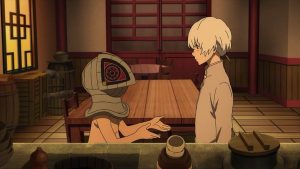 The show I have as my top pick going into a season by no means always finishes there. Even if it’s based on a manga I’ve read – one need look no further back than last season with Horimiya (very good of course but eclipsed by Koi Byoui Ramune and Kemonjo Jihen) for proof. It looked like that might be the case this season too, as Fumetsu no Anata e had a relatively pedestrian run of episodes after the sublime premiere, and this season offers a lot of competition. Nomad, as the very least, looked like a cinch to claim the top of the podium.
The show I have as my top pick going into a season by no means always finishes there. Even if it’s based on a manga I’ve read – one need look no further back than last season with Horimiya (very good of course but eclipsed by Koi Byoui Ramune and Kemonjo Jihen) for proof. It looked like that might be the case this season too, as Fumetsu no Anata e had a relatively pedestrian run of episodes after the sublime premiere, and this season offers a lot of competition. Nomad, as the very least, looked like a cinch to claim the top of the podium.
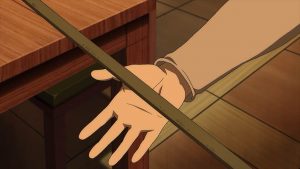 That still may happen – Nomad remains great, and Mars Red and SSSS.Dynazenon are pretty darn good too. But there’s a bit of a “normal service has been restored” feel to Fumetsu at the moment. Unlike with Horimiya, to the extent its momentum slowed To Your Eternity’s slowed as a result of the source material, not adaptation changes. Sometimes mangaka will put an atypical arc in near the beginning of the series, trying to grab the audience with something more “instant gratification”. It’s easy to look back and be struck by how much the Yanome Arc is unrepresentative of this series as a whole, but at the time there was no way to know that.
That still may happen – Nomad remains great, and Mars Red and SSSS.Dynazenon are pretty darn good too. But there’s a bit of a “normal service has been restored” feel to Fumetsu at the moment. Unlike with Horimiya, to the extent its momentum slowed To Your Eternity’s slowed as a result of the source material, not adaptation changes. Sometimes mangaka will put an atypical arc in near the beginning of the series, trying to grab the audience with something more “instant gratification”. It’s easy to look back and be struck by how much the Yanome Arc is unrepresentative of this series as a whole, but at the time there was no way to know that.
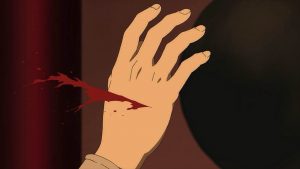 This arc is so much better, so much subtler, so much deeper. As did the premiere, it achieves great emotional resonance precisely by not emotionally pandering to the audience. There’s something of Made in Abyss to Fumetsu no Anata e, in the way it places children in the path of great physical and emotional harm in a very nonchalant way. That tonal contrast was missing entirely in the prior arc, and I find it to be an essential component of this series’ magic. Without it, Fumetsu is very ordinary. With it, it becomes transcendent.
This arc is so much better, so much subtler, so much deeper. As did the premiere, it achieves great emotional resonance precisely by not emotionally pandering to the audience. There’s something of Made in Abyss to Fumetsu no Anata e, in the way it places children in the path of great physical and emotional harm in a very nonchalant way. That tonal contrast was missing entirely in the prior arc, and I find it to be an essential component of this series’ magic. Without it, Fumetsu is very ordinary. With it, it becomes transcendent.
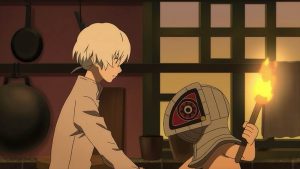 What seemed like such an idyllic (if weird) family last week shows off its ugly underside this time. Gugu’s eagerness to see Fushi show off his powers is a reminder that he’s very much a boy, capable of thoughtlessness and fits of pique. But his advice to Fushi – “just say to stop if you want to stop” – in a pretty goddam valuable lesson for him to learn. And their experiments reveal an interesting power which Fushi himself doesn’t really understand – he can make things, out of thin air. Perhaps it has to be something that’s hurt him, perhaps it’s something else, but it’s a paranormal ability above and beyond the scope of immortality.
What seemed like such an idyllic (if weird) family last week shows off its ugly underside this time. Gugu’s eagerness to see Fushi show off his powers is a reminder that he’s very much a boy, capable of thoughtlessness and fits of pique. But his advice to Fushi – “just say to stop if you want to stop” – in a pretty goddam valuable lesson for him to learn. And their experiments reveal an interesting power which Fushi himself doesn’t really understand – he can make things, out of thin air. Perhaps it has to be something that’s hurt him, perhaps it’s something else, but it’s a paranormal ability above and beyond the scope of immortality.
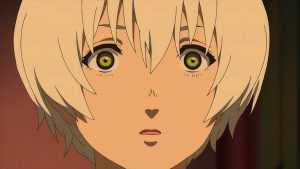 I don’t think there’s any malice in this from Gugu, just immaturity and boyish curiosity. As for Jiji I can’t be so forgiving. He reveals – in quite casual and cheerful fashion – that while Gugu was near death he implanted an organ in him to produce alcohol. Why? “Because I always wanted to try it, and I couldn’t resist”. This explains Gugu’s distended belly of course, and for a child who already thinks himself a freak, to find out the person he trusted did this to him is a cruel blow. Jiji did in fact save Gugu’s life, but he reveals himself to be a remarkably twisted person here, and he clearly has no idea why anyone would feel that way.
I don’t think there’s any malice in this from Gugu, just immaturity and boyish curiosity. As for Jiji I can’t be so forgiving. He reveals – in quite casual and cheerful fashion – that while Gugu was near death he implanted an organ in him to produce alcohol. Why? “Because I always wanted to try it, and I couldn’t resist”. This explains Gugu’s distended belly of course, and for a child who already thinks himself a freak, to find out the person he trusted did this to him is a cruel blow. Jiji did in fact save Gugu’s life, but he reveals himself to be a remarkably twisted person here, and he clearly has no idea why anyone would feel that way.
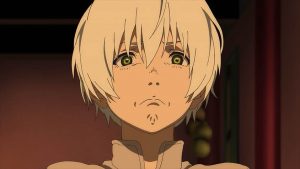 Gugu, shattered, runs away. And no one goes after him – only Rean, who’s talked her way into moving in so she can be close to Fushi (clearly she’s a runaway herself) argues in favor of it. Fushi sets about trying to do the jobs Gugu did (badly), Pioran frets over who will do the cooking, and Booze-man bemoans the loss of his valuable human still. Meanwhile Gugu goes back to the man he worked for before his accident, and he turns out to be exceedingly kind and tolerant. He even invites Gugu to become a part of his family. Unfortunately the same can’t be said about his sons, the older of whom basically drives Gugu out of the house after he reveals his true face to the family.
Gugu, shattered, runs away. And no one goes after him – only Rean, who’s talked her way into moving in so she can be close to Fushi (clearly she’s a runaway herself) argues in favor of it. Fushi sets about trying to do the jobs Gugu did (badly), Pioran frets over who will do the cooking, and Booze-man bemoans the loss of his valuable human still. Meanwhile Gugu goes back to the man he worked for before his accident, and he turns out to be exceedingly kind and tolerant. He even invites Gugu to become a part of his family. Unfortunately the same can’t be said about his sons, the older of whom basically drives Gugu out of the house after he reveals his true face to the family.
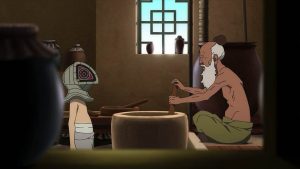 The stuff Gugu endures here is pretty damn brutal, yet it’s handled in an extremely understated fashion. And he remains determined and remarkably positive for a while, even ditching his helmet (after punks rip it off him as a prank) to let the world see who he truly is. But constantly being called a monster takes its toll, and eventually the farmer’s son tells Gugu not to even come to work anymore because of the damage it’s causing the family’s reputation. Most heartbreakingly of all, Gugu spots Shin in an alleyway, drunk and emaciated. And he gives his brother his ring, on the grounds that no matter whether he sells it or not he’ll still be a monster and an outcast, while Shin – who abandoned him and failed at life – might still be able to live as a human being.
The stuff Gugu endures here is pretty damn brutal, yet it’s handled in an extremely understated fashion. And he remains determined and remarkably positive for a while, even ditching his helmet (after punks rip it off him as a prank) to let the world see who he truly is. But constantly being called a monster takes its toll, and eventually the farmer’s son tells Gugu not to even come to work anymore because of the damage it’s causing the family’s reputation. Most heartbreakingly of all, Gugu spots Shin in an alleyway, drunk and emaciated. And he gives his brother his ring, on the grounds that no matter whether he sells it or not he’ll still be a monster and an outcast, while Shin – who abandoned him and failed at life – might still be able to live as a human being.
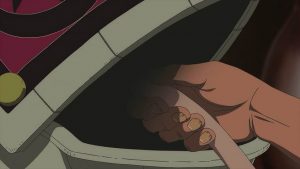 Ack – Gugu is such a Gu-good person, and life has treated him so unfairly (yes, this is a recurring theme in Fumetsu). To see a sweet and relentlessly positive kid like Gugu driven to such despair and hopelessness that he’d do what he did with Rean’s ring is agonizing – especially as it’s not oversold for melodrama, but allowed to break you under its own power. Fortunately for Gugu Fushi hasn’t given up on him – and he arrives just in the nick of time, as a couple of hoodlums have just kidnapped him with intent to sell him to a freakshow. “Kaibutsu banzai!” indeed – screw the normies who judge and reject. One thing Gugu can be sure of is that Fushi, if no one else, will never reject or betray him because of who or what he is. And that’s the sort of friend anyone would be glad to have.
Ack – Gugu is such a Gu-good person, and life has treated him so unfairly (yes, this is a recurring theme in Fumetsu). To see a sweet and relentlessly positive kid like Gugu driven to such despair and hopelessness that he’d do what he did with Rean’s ring is agonizing – especially as it’s not oversold for melodrama, but allowed to break you under its own power. Fortunately for Gugu Fushi hasn’t given up on him – and he arrives just in the nick of time, as a couple of hoodlums have just kidnapped him with intent to sell him to a freakshow. “Kaibutsu banzai!” indeed – screw the normies who judge and reject. One thing Gugu can be sure of is that Fushi, if no one else, will never reject or betray him because of who or what he is. And that’s the sort of friend anyone would be glad to have.


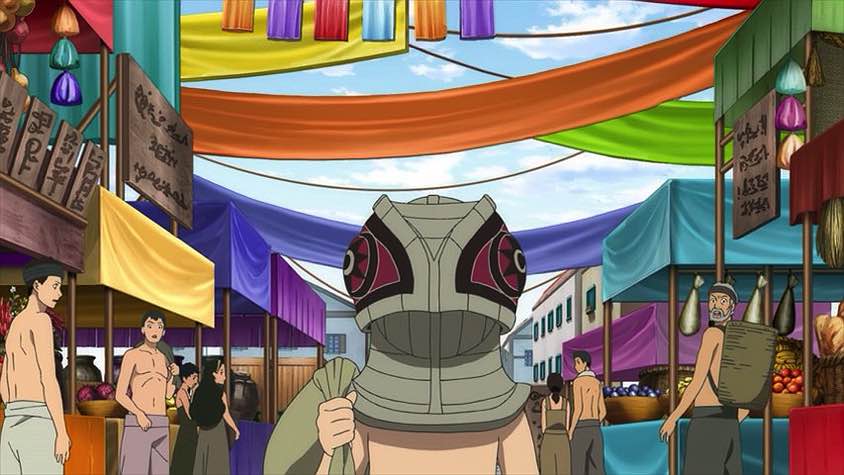
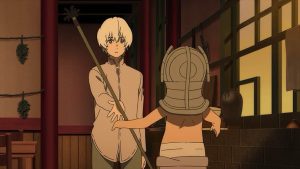
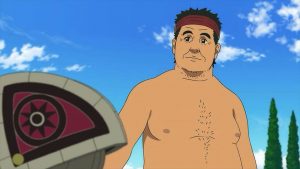
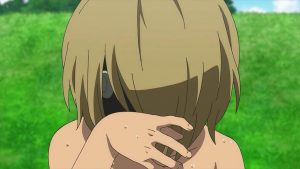
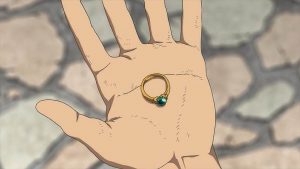
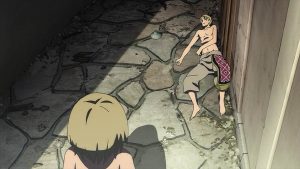
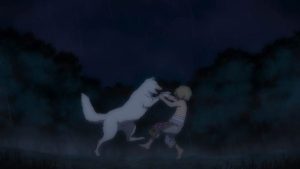
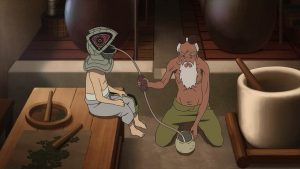
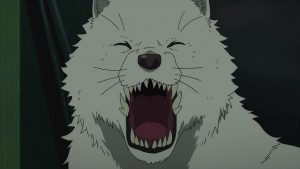
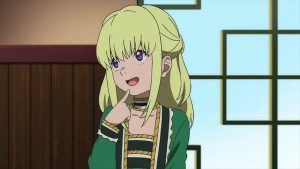
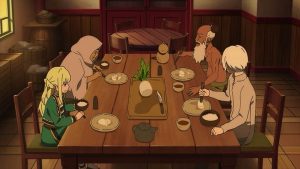
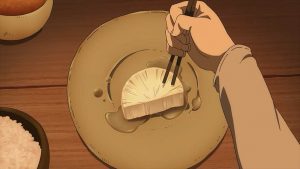
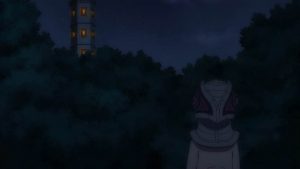
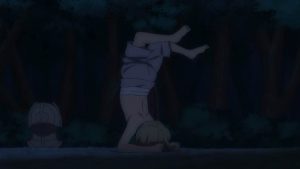
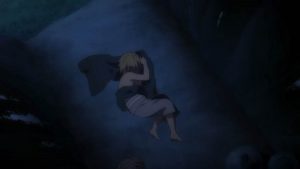
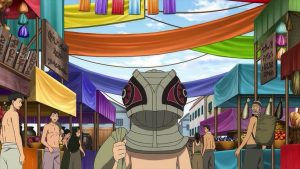
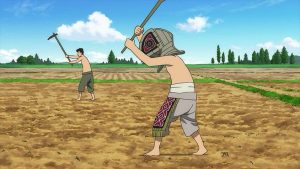
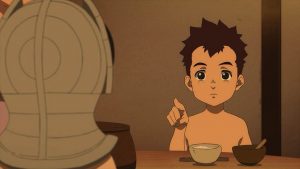
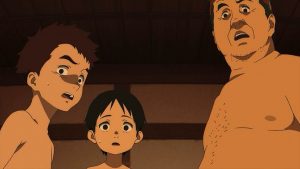
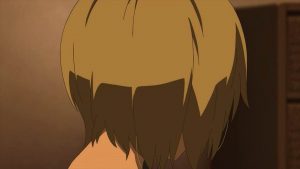
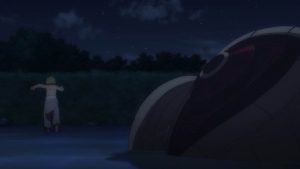
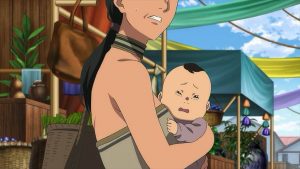
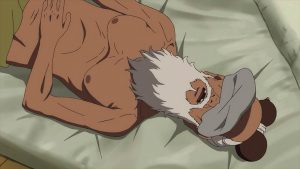
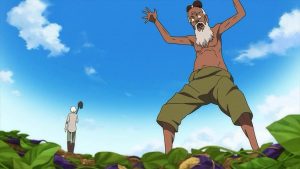
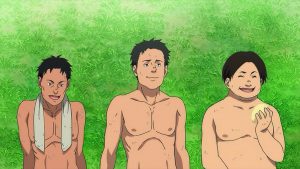
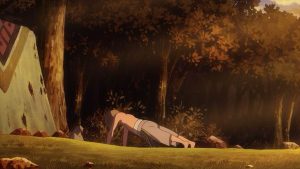
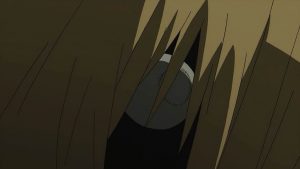
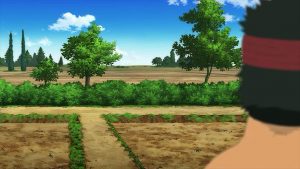
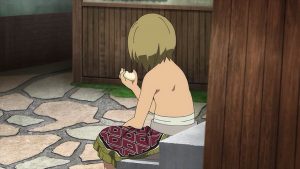
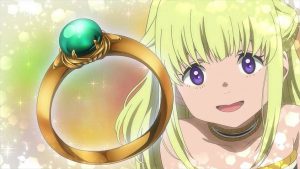
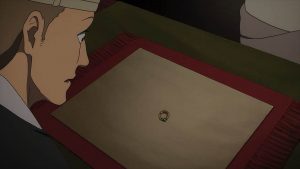
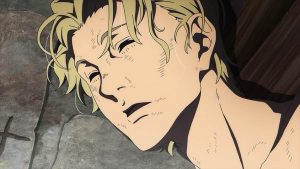
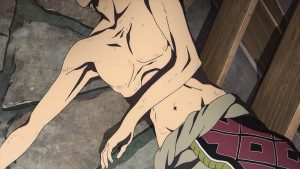
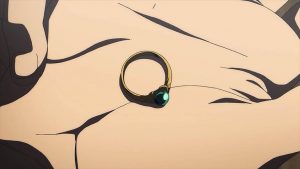
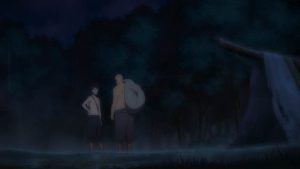
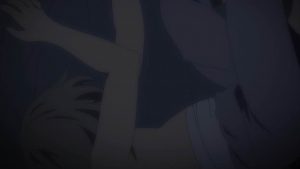
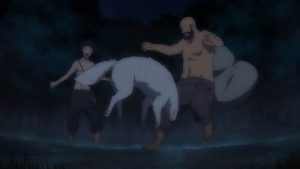
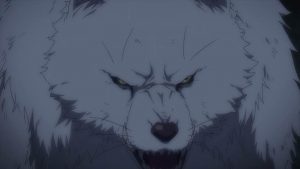
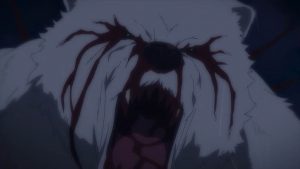
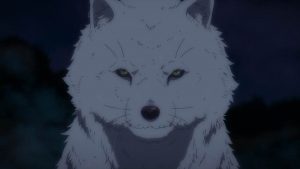

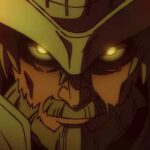
Red
June 1, 2021 at 8:49 pmAlso additional growth for Fushi who faced his fear of the forest and his(its) desire to learn more. Held myself back in the premiere but I shed a tear here.